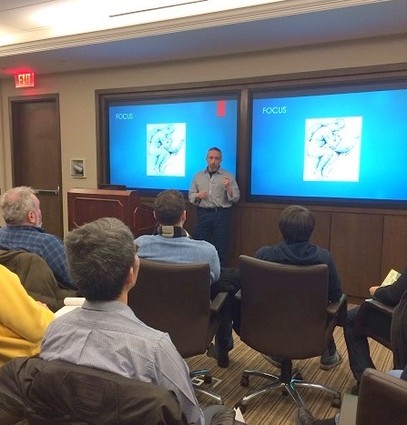Bizyhood’s Latest Launch Focuses on Social Media and Engagement

In mid-October, Bizyhood — the Asbury Park-based startup that is developing a product to enable small local businesses to better engage with their customers and the community — announced the launch of its latest version.
With the new version, small business owners will be able to share events and promotions to many social media sites, such as Facebook, Twitter, Google+ and LinkedIn, all with a single click.
Other new features include a redesigned business detail page, with a more fluid and intuitive feel, as well as extended space for information on company attributes, events, and promotions; and a redesigned dashboard, now a “one-stop shop” where users can manage their businesses.
Also, the site is mobile ready. An app is on its way, but for now Bizyhood has designed a responsive site that works well on cell phones and tablets.
At first glance, the Bizyhood product looks like a local directory, but it is much different.
Cofounder and CEO Scott Barnett explained: “Small business owners have lots of options for places to advertise, but not nearly as many options to engage with customers, particularly in a hyperlocal manner — which is where most, if not all, of their potential customers live. It’s common knowledge that it costs much more to acquire a new customer than to grow an existing one, but small business owners have struggled to harness the power of their customers’ voice online. Bizyhood aims to change that.”
In a recent interview with NJTechWeekly.com, Barnett said that Bizyhood, which is still evolving, learning from customers and iterating, has already signed up well over 100 businesses. About 90 of them have been vetted and approved for inclusion on the site.
He explained that, at this stage, the company is onboarding business owners by contacting them to confirm that they are the legitimate owners of their businesses and to verify their information. However, a more scalable method will be in the offing as the site grows.
“We want very, very clean data for the business owner and the directory owner. This is a benefit to the business owner, because if their data is put in cleanly, it actually makes them easier to find on Google,” Barnett said.
“Our communication channel gives business owners more control than a typical review site, with the caveat that we do NOT allow business owners to remove feedback unless it is defamatory.” he continued.
“All content is available for display, with no filtering, and we strongly urge business owners to reply to feedback, just like they would do in person. We have already found that just this small level of engagement, on a regular basis, can allow a local niche business to ‘rank’ on Google against its competition.
Bizyhood is working with hyperlocal publishers so that small businesses can be noticed by the local press. “They want to appear in a local newspaper, a chamber of commerce site, or a local events page. Our goal is to be able to give small businesses the ability to press one button and send their information to hyperlocal destinations, along with social media sites,” said Barnett.
“For businesses that do a lot of events, this can be a tremendous time saver. They can spend hours a week going to all the different local destinations where they want to expose their information,” he added.
On the flip side, Bizyhood plans to offer a backend system to hyperlocal publishers. At a minimum, it will provide an RSS feed of all the events and general business information in the publishers’ geographic areas, so they can post the relevant content on their pages.
Barnett explained that this provides additional content for the publishers, and benefits small businesses as well, as they now have a way to publicize their free events. However, if a business wants to advertise a paid event or a promotion, it may have to pay the publisher for the opportunity. But this could be another way for the publisher to provide directory information to its local audience.
The publisher that offers Bizyhood to its advertisers becomes a sales conduit for the product, and puts a local face on who is offering the platform. Instead of being asked to trust Bizyhood, the new guy on the block, small businesses will be asked to trust their neighbors, i.e., the hyperlocal publishers.
“There is so much animosity against the large companies such as Yelp. Even Google has struggled to win over the small business owner. What we hear again and again is that ‘these companies don’t know us and we don’t know them.’ For a business owner, almost all of their business is personal,” Barnett said.
Reaching the small business owner with an online outlet has proven difficult for new entrants into this market, Barnett agreed. Many small businesses change from one advertising outlet to another as they try to get results from their small advertising budgets. When one advertising outlet stops working, the small business owner will switch to another.
Bizyhood’s plan is to eliminate the constant switching. “Advertising is an important part of a small business’s marketing efforts, but so is engagement … By focusing exclusively on the benefits of engagement, we are showing small business owners how to create lasting online relationships between their business, their customers and the community,” Barnett concluded.

